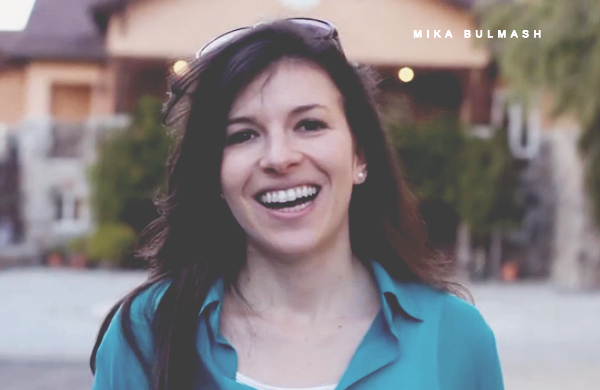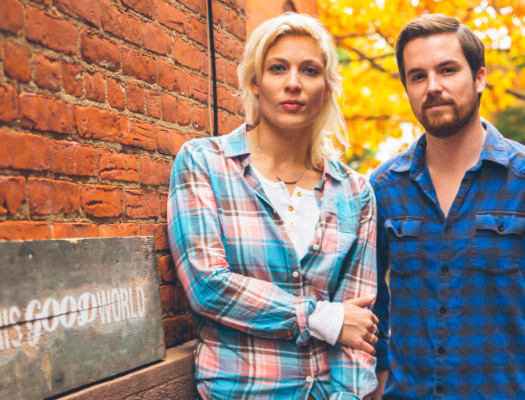Meet Mika Bulmash of Wine for the World
Mika Bulmash, Founder of Wine for the World, demonstrates that passion and career do not need to be mutually exclusive – you can create a business that pays the rent and do something that you love. Wine for the World encourages social responsibility and environmental sustainability while also providing opportunities for emerging winemakers to share their high quality products with consumers in the US. I had the opportunity to learn more about Mika’s mission and what advice she has for young entrepreneurs who want to make a positive difference in the world.
What inspired you to start Wine for the World?
My professional background is in international development, and I have had a passion for wine for a very long time. For years, I tried to think of a way that I could sustainably combine the two. The company I worked for just prior, a Washington DC based international development consulting firm that implemented USAID projects, was working on a wine project in Moldova. I realized that if the US government recognized the importance of the wine industry to one country’s economy to fund a multimillion dollar program, there was something there – but I wanted to take a private sector approach, not one in which was dependent on government funding.
So I took the leap of faith, quit my job (where I had mostly focused in Latin America), and traveled to South Africa for the harvest. I chose South Africa because I knew wine quality was high, and I was interested in what the landscape looked like in the post-apartheid era. I approached my research in the same way I conducted my former development work – to find out what was needed and how I could help. The resounding message was that their wine industry was seeking additional market access – and US market access, in particular. But how do you convince US consumers to try a product from an unfamiliar region when there is little understanding of wine quality or varietal style?
So when I came back, I worked through different business models and linked up with the International Society of Africans in Wine, who was pursuing a somewhat similar objective. I kept coming back to the notion of a seal of approval – quality-assurance, so that consumers would be guaranteed a great product. My pie-in-the-sky idea was, “What if we could attract some of the greatest, most highly-coveted US winemakers to provide technical assistance and ensure the product would be fantastic?” As it turns out, it wasn’t a far reach at all. The wine industry here was excited to get on board.
What is your business model? How does it benefit consumers, winemakers, and developing wine markets abroad?
We are a collaborative, premium wine brand that operates at different points in the wine value chain. We have a 5-step process in which Wine for the World facilitates the process of wine production by acting as negociant (essentially guaranteeing a price for wine with certain specifications), adding the expert winemakers, helping bring the wines to the US, and markets and selling the wine. Our model offers both technical support and importantly, a marketing outlet for wine sales – which is one of the biggest hurdles for wine brands abroad. Then, we share the proceeds of the wine sales.
What we’re doing is really exciting for consumers! Right now, many of our US winemakers offer their limited-quantity wines for price points that can be outside of the reach of many consumers. We’re offering wine drinkers the chance to access some of the US’ best winemakers at significant value and also expand their horizons by exploring new wines in a confident space. And the best part is that they are contributing to a great cause by doing what they already love to do – explore. They’re giving a chance for a winemaker from a developing country to make a name for his or herself in the US and develop a following. Through Wine for the World, we even hope that our “emerging” winemakers will train others down the road. It’s a win-win for everyone, because we are guaranteeing quality and providing opportunity at the same time.
We are helping to develop wine markets abroad by breaking down barriers and encouraging wine sales for wines from unfamiliar, exotic regions. The wine industry plays an enormous role in the economies of many emerging markets, and obtaining enhanced market access to the US would be deeply impactful. So in helping consumers explore wines from new regions, we are also contributing to their economies. To use South Africa as an example, if our marketing efforts can help increase its US import market share from 1% to just 1.2%, over five years, we will help channel $100 million to the South African economy alone, while encouraging the promotion of socially and environmentally responsible winemaking. And this is a completely attainable goal – the Argentinian wine market has more than tripled in the same period of time. Many countries are already exporting wines in tiny volumes to the U.S. We’re creating inroads for these categories to gain momentum in the US.
Do you believe NYC and the rest of the country are ready for a change in the wine market?
Absolutely. The time is very right for this for three important reasons. First, we’re in an age of increasing exploration. As our world becomes more connected, we are excited to explore new products, new regions, new ideas. This is true in the wine world too – Wine for the World is just creating a space where we can channel this exploration for economic impact. At the same time, consumers increasingly care about the process behind the products they purchase. Ethics are playing a larger role in purchasing decisions. The wine industry has yet to embrace on a wide scale the opportunity to connect with this ethics-oriented market on an international, premium scale.
How can we encourage wine lovers and others to be more conscious of products that raise awareness and provide opportunities to expanding countries?
By simply thinking about what they buy, consumers have the ability to make a meaningful difference when purchasing wine. Wine for the World is attempting to highlight awareness about where wine can come from, how it is made, and who gets to produce it. We want people to think about the process behind the products they purchase. Through this awareness, we are creating a platform for consumers to confidently explore wines from unfamiliar regions and as a result, offer opportunities for winemakers and their corresponding wine regions to succeed in the US.
How did your background in non-profits and for-profits in public health, food security, and agriculture prepare you to launch your own business?
In short, being accustomed to working very hard. I dedicated myself to long days and nights where I was responsible for managing a multi-million dollar portfolio of projects in those sectors. I monitored the budget, personnel, contract management, technical activities, conducted monitoring and evaluation, and was charged with myriad pieces of implementing development programs. There are many facets to running a business. You have to wear many hats, and my previous experience played a key role in preparing me for it.
What business and/or personal goals do you have for 2013?
We’re crowd sourcing our first release through the end of May in order to bring back our first release of wines this fall. Meeting our financing goals would enable all of us who care so much about providing this opportunity to share our winemakers’ stories with the US. So, my sole goal is to get the financing we need.
Do you have any advice for aspiring entrepreneurs who want to incorporate their passion and desire to contribute positively to our global community while also ensuring a sound business model that can pay their rent?
The most valuable lesson that I think I learned was the importance of building a team that shares the same vision and will lobby and work for your mutual cause. It’s through team-building that you’re able to make the transition from idea to reality. It will make your experience infinitely easier.
In terms of a sound business model, I think it’s imperative to highlight financial viability. It’s easy to get swept away in the brilliance of a socially responsible idea. I think the most brilliant and the most sustainable business models are those that find a way to traverse the territory of social and environmental responsibility via the economically sustainable path. It may sound obvious to some – but sell something that people want. If there is no financial engine to move an idea forward, the social good of your business will also be left behind. We are the next generation of entrepreneurs, and we have a really terrific opportunity to develop business models that both contribute to global good and enable us to be players in our respective fields. Let’s do more than use good as a tool for business. Let’s use business as a tool for good.
My last piece of advice would be to support yourself with entrepreneurs from all industries. New York has a robust and impressive community of people who are constantly inspiring each other. Keep your community diverse.
You can support Wine for the World and gain access their first limited-release of high-quality, responsibly produced wines until May 31 by visiting their Indiegogo page bit.ly/letsmakewine, or their website at www.wine4theworld.com.
Learn more about Wine for the World.
Connect via Facebook and Twitter.



